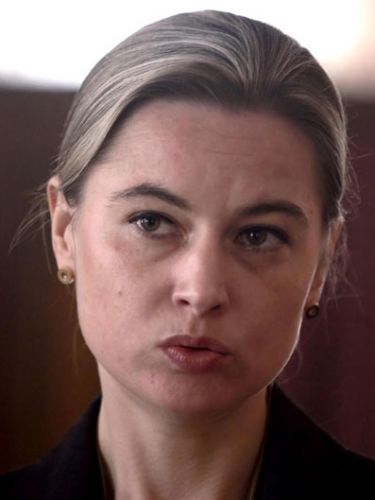Certainly, the charismatic Vice-Chairman of the President Administration of Belarus produced a strong impression upon the foreign delegation: in his Index on Censorship blog, Mr Jayasekera compared her to Margaret Thatcher. Still, she failed to convince the guests that Belarusian government was doing well to ensure the freedom of expression. 
“Not for nothing is Petkevich regarded as a real power behind the throne. She is the official that heads the nationwide network of ‘Ideological Departments’ – an un-ironic recreation of a Soviet-style system instituted a few years ago by the Lukashenka administration to institutionalise state control over every corner of daily life“, – noted Mr Jayasekera.
What attracted the British journalist’s attention was that the ideology network is “operating on informal rules, more or less made up as they need“.
„But when I pressed the point about the unfairness of a system of  regulation without written rules she exploded into a tirade against ill-informed foreigners hunting imagined “white bears in the woods”, – shares Jayasekera.
regulation without written rules she exploded into a tirade against ill-informed foreigners hunting imagined “white bears in the woods”, – shares Jayasekera.
Yet, according to other delegation members’ interviews for Belarusian media, the “Iron Lady” actually admitted changes are needed in Belarusian media sphere. “No matter how slowly, still the situation is changing”, – she was quoted as saying in independent Naša Niva weekly.
By the way, Naša Niva was an unexpected beneficiary of one of Piatkevich’s changes of position. The ban on sales of the newspaper printed version through the state-run networks was lifted earlier this year, partly to placate the EU’s complaints to Piatkevich about the distribution restrictions.
After leaving Belarus, the group issued a statement urging Belarusian authorities to undertake „much needed reforms of the media environment“.
Please find the full text of statement below as provided by the Belarusian Association of Journalists and International Federation of Journalists.
Statement by International Mission to the Republic of Belarus
A group of international media and press freedom organisations called upon the Belarus authorities to bring the country’s media environment into accordance with international standards, following the visit of a joint delegation to Minsk from 20 to 24 September 2009.
The group welcomes recent changes and recognises that pressure on media and journalists has eased. However, this must be translated into a lasting commitment to ensure the rights of journalists and to undertake much needed reforms of the media environment. Such changes need to be far reaching and irreversible.
The delegation met with media organisations and with authorities of Belarus in Minsk to exchange views and assess the current situation of the media, press freedom, freedom of expression and access to information.
The participating organisations and signatories to the present statement will present a full report as a contribution to the Human Rights Dialogue and share it with other international organisations.
The undersigned organisations, consider that:
a) Economic conditions for media outlets are not equal for all. Belsayuzdruk and Belposhta distribution systems limit access and circulation of newspapers. These restrictions hinder the development of an independent and pluralistic media landscape;
b) and arbitrary allocation of broadcast licences and frequencies hinder the development of independent and pluralistic broadcasting;
c) Access to information is restricted, in particular because of the adoption and implementation of laws that limit the journalists’ right to information, or discriminate between state and media in accessing information of public interest;
d) Accreditation of journalists working for Belarus or foreign media, as well as the registration of offices of media, are restricted by and discriminatory decisions of the authorities;
e) Belarus legislation on defamation and extremism limits press freedom, leads journalists to and is not in line with European and international standards on press freedom;
f) Although we welcome the new dialogue on ethics and , the group highlights the importance that action on this issue should be driven by the media community itself.
Recommendations:
The following recommendations made by the group are aimed at improving and strengthening the media environment in Belarus for state and media, as well as enhance professionalism, pluralism and the role of media in a democratic society.
1) Editorial independence of state and media must be respected and they should not be targeted for their professional activities;
2) media should have the right and possibility to operate and develop under fair economic conditions, including the right to be distributed without restriction or discrimination;
3) Rules and conditions for accreditation of journalists should be established. They should be transparent, unambiguous and fair, and seek to allow access for all journalists to information of public interest;
4) Journalists should not be obstructed from reporting on public events and demonstrations;
5) The allocation of broadcasting licenses and frequencies should be defined by a legislation according to international standards and overseen by a fully independent regulator to ensure pluralism in the broadcasting sector;
6) The ‘Law on the Media’, the ‘Law On Counteraction to Extremism’ and articles of the Criminal Code relating to defamation, should be reformed to bring them into line with international press freedom and freedom of expression standards;
7) Authorities should ensure equal treatment of organisations representing journalists;
8) Media, authorities and civil society should continue the dialogue on improving media policies and practices.
Organisations signing this statement stand ready to provide expertise and support in assisting the media community and authorities to realise these recommendations.
Minsk, 24 September 2009
The organisations signing up to this statement include:
1. Article 19
2. Civil Rights Defenders
3. Committee to Protect Journalists
4. Danish Union of Journalists
5. Index on Censorship
6. International/European Federation of Journalists
7. International Media Support
8. International Publishers’ Association
9. International Pen
10. International Press Institute
11. Open Society Institute
12. PressNow
13. Reporters without Borders
14. World Association of Newspapers and News Publishers
Contact:
Marc Gruber, European/International Federation of Journalists
marc.gruber@ifj.org
+32 2 235 22 00


